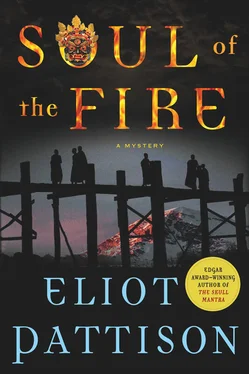Eliot Pattison - Soul of the Fire
Здесь есть возможность читать онлайн «Eliot Pattison - Soul of the Fire» весь текст электронной книги совершенно бесплатно (целиком полную версию без сокращений). В некоторых случаях можно слушать аудио, скачать через торрент в формате fb2 и присутствует краткое содержание. Год выпуска: 0101, ISBN: 0101, Издательство: St. Martin, Жанр: Полицейский детектив, на английском языке. Описание произведения, (предисловие) а так же отзывы посетителей доступны на портале библиотеки ЛибКат.
- Название:Soul of the Fire
- Автор:
- Издательство:St. Martin
- Жанр:
- Год:0101
- ISBN:9781250036476
- Рейтинг книги:4 / 5. Голосов: 1
-
Избранное:Добавить в избранное
- Отзывы:
-
Ваша оценка:
- 80
- 1
- 2
- 3
- 4
- 5
Soul of the Fire: краткое содержание, описание и аннотация
Предлагаем к чтению аннотацию, описание, краткое содержание или предисловие (зависит от того, что написал сам автор книги «Soul of the Fire»). Если вы не нашли необходимую информацию о книге — напишите в комментариях, мы постараемся отыскать её.
Soul of the Fire — читать онлайн бесплатно полную книгу (весь текст) целиком
Ниже представлен текст книги, разбитый по страницам. Система сохранения места последней прочитанной страницы, позволяет с удобством читать онлайн бесплатно книгу «Soul of the Fire», без необходимости каждый раз заново искать на чём Вы остановились. Поставьте закладку, и сможете в любой момент перейти на страницу, на которой закончили чтение.
Интервал:
Закладка:
Someone called out in pain from the adjoining ward. The nurse ran down the corridor. Shan gently pulled his hand from under the head of the now sleeping dog and slipped away.
Outside, some of the Tibetan vendors were beginning to pack up under the watchful eye of two uniformed knobs, stationed to keep the Tibetans from entering Zhongje. Shan wandered along the row of goods laid out on blankets and small tables, nodding at the weary but cheerful vendors. He bought a stick of roasted crabapples and was nibbling them when he saw the Americans at the far end, examining the small rugs of a bearded vendor. Hannah unexpectedly turned and pointed toward the prison as if explaining something to the confused vendor.
Shan’s heart sank as he saw that the knobs had noticed her, and were marching hastily toward the American. She bent and threw a stone toward the prison. The knobs quickened their pace. Shan let them pass him, then moved along the row in the same direction. As the knobs reached Hannah, she threw another stone and, to Shan’s horror, shouted “Long live the Dalai Lama!” The frustration and hypocrisy of being a Commissioner that were gnawing at her had finally reached their limit. The words were in English, but the knobs seemed to understand. They pulled out their batons and shouted at her. Hannah threw another rock. The rug vendor backed away in fear.
The knobs waved their batons and shouted in Chinese. Shan quickened his pace. Hannah called out her words again, and the batons went closer, warning strokes that sliced the air, inches from her shoulders. Shan broke into a run. “Just a mistake!” he cried out. “She’s an American-” Suddenly he tripped and was on the ground. A baton slashed out and Hannah ducked in the wrong direction. The baton glanced off her head.
The knobs froze, horrified, as blood began flowing down the American’s temple. Shan knew they would never have intended to actually hit a foreigner. Judson appeared from behind Shan and ran to Hannah’s side. One of the knobs helped support her while the other ran ahead to the infirmary.
Neither of the Americans looked at Shan as they passed him. He moved on toward Yamdrok, pausing to look back as he topped the rise in the road. The vendors, shaken by the incident, were hurriedly packing up. Hannah and her frantic escort had disappeared behind the town wall. He replayed the scene in his mind. She knew better than to cause such a disturbance. Judson had worked his way behind Shan. When the knobs were swinging their batons, Shan had fallen on something. Had Judson tripped him to prevent Shan from reaching his companion? It was as if the Americans had planned for Hannah to be struck by the knobs. Something was happening before his eyes that he could not understand. Everyone in the drama before him was desperate and reckless, and his every instinct screamed that tragedy was about to strike again.
He sat against a boulder on the Yamdrok road, looking back at the gate where the Americans had disappeared. He found himself drawing in the loose soil, a block consisting of a line of three short segments, over a line of two segments, then repeating the pattern of three and two. It had been too long since he had consulted the Tao Te Ching. Without conscious effort, he had drawn a tetragram. It denoted Verse Seventy-one, one of his father’s favorites: “To know that you do not know is best. To not know of knowing is a disease.”
* * *
Lokesh was sitting outside by the bright red door of the old farmhouse, reciting a mantra as a goat watched him intently. He greeted Shan with a bright smile and quickly put away his beads to embrace Shan, pulling him tightly into his chest as if they had not seen each other for a long time. “Look!” he exclaimed, and gestured to the goat’s head. Shan saw now the red yarn that had been tied around a bundle of long hair on its neck. “Tserung and Dolma ransomed a goat in my honor!”
It was an old custom that, like so many others, had been banned by Beijing. As a way of showing compassion and celebrating an event, Tibetans would tie yarn or ribbon on a domestic animal, buying the animal if it did not belong to them. Once an animal was so marked, it could never be slaughtered.
“It’s a fine goat,” Shan offered.
Lokesh laughed. “It’s a happy goat!” He gestured at Shan to follow him up the path around the back of the house. They did not stop until they reached the top of the first small knoll.
“I discovered this vantage point last night,” he said, nodding toward the upper slope above Yamdrok. “This is the way it was meant to be seen. The buildings remember.”
Shan turned to see that Longtou was visible, washed by the setting sun. From their perspective, with the sun’s low angle, the prison fences and nearly all the guard towers were lost in shadow. Even the dirty smokestacks blended into the darkness. But the tile roofs and whitewashed walls of the tall central buildings of the old abbey glowed.
“If you know how to look, you don’t have to see the prison at all,” Lokesh explained. The essential elements of Tibet hadn’t disappeared, his old friend was fond of saying, you just had to know how to look for them.
They silently watched the old abbey as it faded into the shadows, then wandered back to the house. The door opened as they approached. “You will stay,” Dolma announced to Shan. “I made noodle soup.”
Through the back window, Shan saw Tserung completing the final evening chores, carrying a little pail of milk from the back shed, pausing to check the prayer flag on the tall tarchen pole.
It was a magical evening. There was no talk of the Commission, Pao, dissidents, or Beijing. Over bowls of steaming soup seasoned with coriander, the old Tibetans offered tales of their youth, stories of aged uncles who had known the thirteenth Dalai Lama, and anecdotes of the mischief practiced by novice monks and nuns. Dolma recounted the great horse festivals that lasted for days in which her uncle had often won races and her mother had won archery contests. Tserung told a solemn story of meeting one of the state oracles, Lokesh shared tales of attending daylong folk operas in the summer palace below the Potala.
“These are things you must remember, Shan,” Lokesh said with a smile as he sipped salted tea at the end of the meal. Shan hesitated for a moment over the hint of parting in the words, but decided his friend referred just to Shan being a generation younger, so he nodded good-naturedly. As Dolma brought a bowl of apricots and walnuts, Tserung began to speak about how they used to train for the riderless horse races so popular in his youth.
“There is a little dog,” Shan said during a break in the conversation. “A Tibetan terrier named Tonte who is out of place in Zhongje. It needs a home.” The old Tibetans just smiled patiently at him, as if not grasping his suggestion. Dolma began to speak of the winter their abbess woke them up each night to contemplate a comet, then was interrupted by a sudden knock on the door.
Tserung sprang up. “Pavri!” he exclaimed, “I almost forgot.” He opened the door, and a well-dressed Tibetan woman stepped inside.
It took a moment for Shan to recognize Lam’s assistant, who was glancing at her wristwatch. “It’s almost-,” Pavri began, then saw Shan. Her surprise turned to fear, and she backed toward the door.
“It’s just Shan!” Dolma called out, and rose to comfort the woman. But Pavri would not be persuaded to stay. She lifted a hand in farewell and closed the door behind her.
The three Tibetans stared at Shan. He felt somehow he had disappointed them. Dolma reached into her apron, pulled out an old pocket watch, and frowned as she looked at it.
The battery. Suddenly Shan remembered the battery he had seen on the floor. He glanced about the room, then his gaze settled on the high pole beside the goat shed. “The tarchen ,” he observed. “Only the tarchen is new.”
Читать дальшеИнтервал:
Закладка:
Похожие книги на «Soul of the Fire»
Представляем Вашему вниманию похожие книги на «Soul of the Fire» списком для выбора. Мы отобрали схожую по названию и смыслу литературу в надежде предоставить читателям больше вариантов отыскать новые, интересные, ещё непрочитанные произведения.
Обсуждение, отзывы о книге «Soul of the Fire» и просто собственные мнения читателей. Оставьте ваши комментарии, напишите, что Вы думаете о произведении, его смысле или главных героях. Укажите что конкретно понравилось, а что нет, и почему Вы так считаете.












